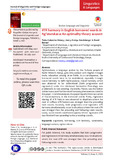| dc.contributor.author | Tioko, Celestine Nkieny | |
| dc.contributor.author | Nandelenga, Henry Simiyu | |
| dc.contributor.author | Barasa, David | |
| dc.date.accessioned | 2021-12-31T08:59:13Z | |
| dc.date.available | 2021-12-31T08:59:13Z | |
| dc.date.issued | 2021-06-01 | |
| dc.identifier.uri | https://royalliteglobal.com/jlfl/article/view/620 | |
| dc.identifier.uri | https://royalliteglobal.com/jlfl/article/view/620/287 | |
| dc.identifier.uri | http://ir-library.mmust.ac.ke:8080/xmlui/handle/123456789/1969 | |
| dc.description.abstract | Ng’aturukana, a language spoken by the Turkana people of North Western Kenya, gets into contact with English through trade, education, among other fields. As a consequence, the borrowed words have to be assimilated, especially through vowel harmony to befit Ng’aturukana. Vowel harmony which was observed to be bidirectional (both progressive and regressive) under the rule-based Generative Phonology was problematic in rule ordering. Optimality Theory was the better option to account for the vowel harmony phenomenon noted in this paper. From the analyses, this paper reports three outcomes of Vowel Harmony in the borrowed words; firstly, regressive sharing of ATR feature was observed in situations where the root or suffixes ATR feature was stronger than the preceding root vowels. Secondly, both progressive and regressive ATR harmony simultaneously occur in situations where the root ATR was stronger than the preceding and following roots vowels. Lastly, some vowels manifested opacity where regressive ATR was blocked from spreading to the preceding vowels. | en_US |
| dc.language.iso | en | en_US |
| dc.publisher | Journal of Linguistics and Foreign | en_US |
| dc.subject | ATR, harmony, English, borrowed, words, Ng’aturukana, optimality, theory, account | en_US |
| dc.title | ATR harmony in English borrowed words in Ng’aturukana: An optimality theory account. | en_US |
| dc.type | Article | en_US |

